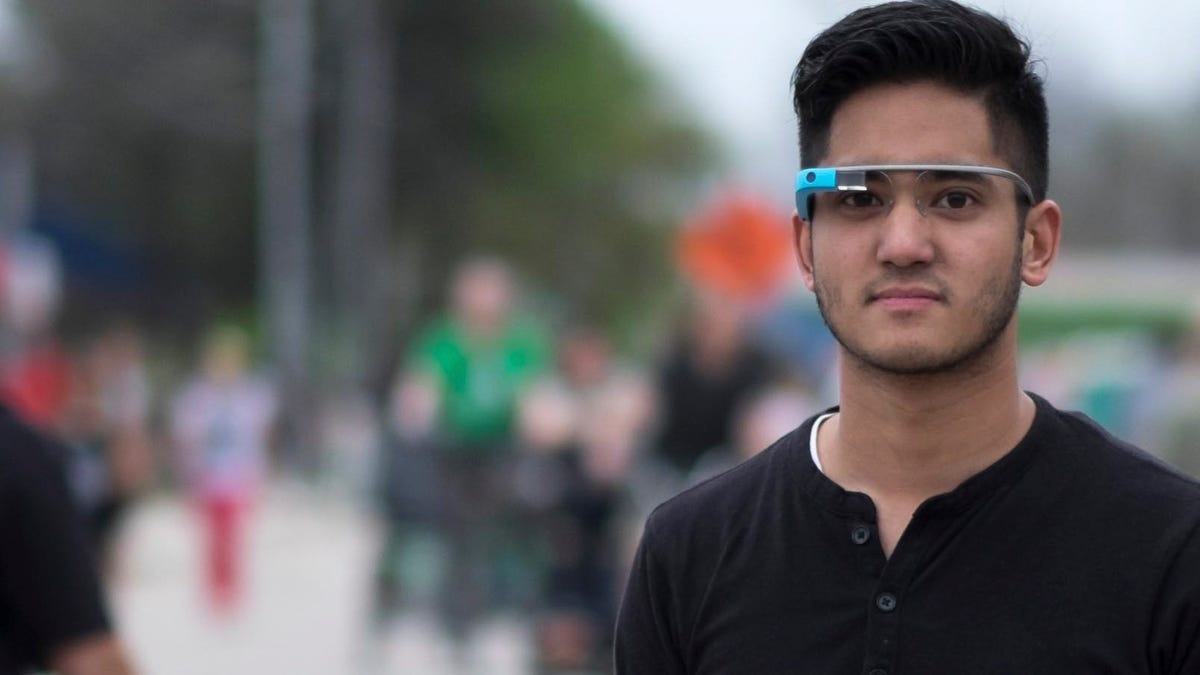I, Explorer: What it's like to wear Google Glass in 2015
Two years ago, the South by Southwest conference in Austin, Texas, was sprinkled with people wearing Google's smart eyewear. This year, it seemed like no one was wearing it. Except me.

OK Glass, teach me empathy.
While writing a feature about the rise and fall of Google Glass, I decided one of the best ways to understand what life was really like for Explorers -- Google parlance for early owners of the device -- was to become one myself. So I went back to where it all really got going: the South by Southwest (SXSW) conference in Austin, Texas, where filmmakers, musicians and the technorati meet every March.
Although Google unveiled its Internet-connected eyewear at its I/O developer conference in 2012, the real coming out party was the following spring at SXSW 2013. In the last several years, tech companies have been going to Austin with the mission of making a big splash with new technology. This year, Meerkat, an app that lets people live-broadcast from their phones, was the standout hit. Twitter used the conference to break out in 2007. Foursquare did it in 2009. Google had the same idea for Glass in 2013, holding sessions and panels on how to develop for the product.
But a lot has changed since 2013. Detractors pushed back against Glass because they feared the built-in camera violated their privacy. Others just thought the headset looked nerdy. "OK Glass," the magic words to trigger the device's voice controls, became a dirty phrase.
At SXSW this year, it seemed like there wasn't a single Glass in sight, except for the CNET-owned set I brought with me. I wasn't the only one struck by the eyewear's absence: "spotted at #SXSW: zero people in google glass," tweeted Fortune's Erin Griffith. (A scan of Twitter after the conference, though, suggests there were maybe two or three of us wearing Glass out of the festival's 35,000 attendees.)
For my experiment, I vowed to wear Glass for at least a day. Here's how it played out:
I put on Glass after waking and made sure it fit properly. I'd already decided I wouldn't take them into the shower.
My first appointment of the day was at the Driskill, an old and opulent hotel in downtown Austin. My Glass got its first peek of daylight when I went to the front porch of my rental house to wait for my Lyft ride to the hotel. Some gardeners across the street saw me, then turned away without a second glance.
My ride never showed up. I started to wonder, could the driver have driven past me, saw what I had on my head, then kept on driving? No, that's insane! That's insane, right?
Of course it's insane. But these glasses had started to mess with my head.
One strongly worded email later, I ordered another Lyft ride. The driver was a nice woman named Jennifer. She asked me what I was wearing on my forehead. She'd never seen them before and told me they are "awesome."
We arrived at the Driskill for my interview with Alex Winter, a documentary filmmaker and actor whose film "Deep Web" premiered at the SXSW film festival the night before. (You may also recognize Winter as Bill from the "Bill and Ted" movies).
Winter's documentary is about Silk Road, an online bazaar for drugs and other contraband, and its alleged founder Ross Ulbricht. The FBI seized the site and convicted Ulbricht last year on seven charges, including drug trafficking and conspiracy. But Winter also talked about the legitimate uses for anonymity software and the importance of fighting against constant surveillance.
I noticed he avoided making eye contact with me. "No one's ever interviewed me while wearing Google Glass before," said Winter, laughing. "It's a little unsettling."
The next night, I went to a party for a digital-music startup called DJ 51 at a rooftop bar downtown. It was my first Glass experience involving alcohol and non-Glass wearers. The app's co-founder greeted me. "Whoa, I'm a little nervous with that," he said. "Can you record me?"
Moments later, a drunk partygoer flashed his iPhone in my face. He started recording me and everyone else in the bar using Meerkat, and broadcasting the video over the Internet. No one batted an eye. "This is the first Google Glass on Meerkat!" he yelled into the camera as he pointed his phone at me.
All in all, I wore Glass for a day and a few hours. The final tally:
- Number of elongated stares I received (that I noticed): About 9
- Number of people who stopped me to ask about it: 4, including one security guard who moonlights as a blogger for the band Insane Clown Posse
- Number of startup founders who feigned interest to pitch me about their product: 1
- Number of times someone tore it off my face: 0
- Number of Lyft drivers scared away: 0? 1?
- Number of awkward bathroom breaks I took while wearing it: 2
After returning from Austin, I spoke with Larry Rosen, a research psychologist who teaches at California State University, Dominguez Hills, about my experience. He focuses on technology and was interviewed for a Google Glass segment last year on The Daily Show.
The experience wasn't so bad, I told him. I got lots of stares but no one was blatantly rude. (Granted, I was among a very tech-entrenched crowd.) He said that kind of reception was to be expected. "You were still an outcast," he said. "But it was more, 'Why is he even wearing those?'"
What a different time it is for Explorers. After such an explosive reaction when the product first entered the market, Google Glass' latest issue isn't controversy. It's irrelevance.

